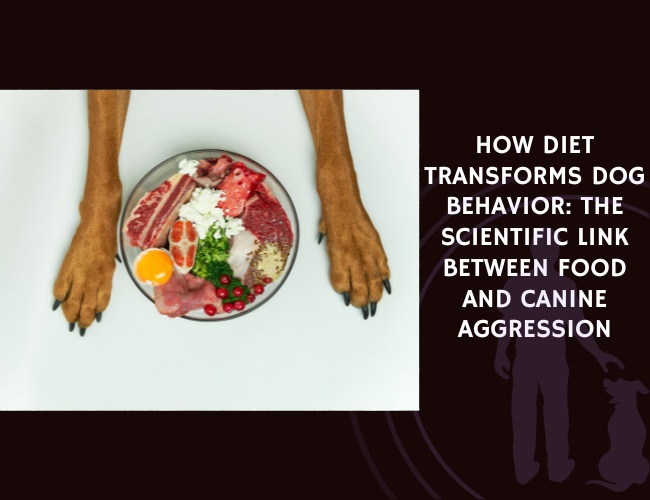Understanding Canine Aggression: An Overview
Understanding canine aggression is pivotal for fostering a harmonious relationship between dogs, their owners, and the wider community. This chapter delves into the different types of canine aggression, its prevalence and impact, and the importance of identifying the root causes of such behavior.
Different Types of Aggression
Fear-Based Aggression
Fear-based aggression is a common form of aggressive behavior in dogs. It arises when a dog perceives a threat and reacts defensively. Dogs displaying this type of aggression may growl, snap, or bite to protect themselves from a perceived danger. Key triggers often include unfamiliar people, loud noises, or sudden movements.
Territorial Aggression
Territorial aggression occurs when a dog perceives a threat to its home or domain. This form of aggression is often aimed at strangers or even familiar guests who enter the dog’s perceived territory. Territorial behavior may be displayed through barking, lunging, or biting, primarily to ward off intruders.
Social Aggression
Social aggression can manifest in dogs that are trying to establish dominance or assert themselves within a social hierarchy. This can occur in multi-dog households or in interactions with humans and other animals. Signs of social aggression include body stiffness, growling, and direct stares. This type of aggression is complex and can be influenced by the individual dog’s temperament and socialization.
Prevalence and Impact on Pet Owners and Society
Canine aggression has a significant impact on pet owners and society at large. Aggressive behaviors can lead to dangerous incidents, injuries, and, in severe cases, result in euthanasia of the dog. For pet owners, managing an aggressive dog can cause stress, anxiety, and financial costs related to training and medical care. In the community, aggressive dogs can contribute to a negative perception of certain breeds and increase the need for public safety measures.
Importance of Identifying Root Causes of Aggressive Behavior
Identifying the root causes of aggressive behavior in dogs is crucial for effective management and treatment. Factors that may contribute to aggression include genetics, early life experiences, socialization, and health issues. For instance, dogs that have not been properly socialized may react aggressively in unfamiliar situations. Similarly, pain or medical conditions can lead to irritability and defensive aggression.
By understanding these underlying factors, pet owners and professionals can develop tailored approaches to mitigate aggressive behaviors. Integrating behavioral training with diet modifications, as will be discussed in later chapters, provides a comprehensive strategy for addressing aggression. This holistic approach not only enhances the well-being of the dog but also fosters a safer and more peaceful environment for everyone involved.
The Science Behind Diet and Behavior
Understanding the relationship between diet and behavior in dogs is crucial in managing and potentially mitigating aggressive tendencies. Nutrition plays a significant role in a dog’s overall well-being, including their mental state and behavior.
Key Nutrients That Influence Canine Behavior and Mood
Certain nutrients have shown to influence canine behavior significantly. When it comes to aggression, the right balance of these nutrients can make a notable difference. Let’s explore some of the key nutritional elements:
- Proteins: Amino acids, the building blocks of proteins, are essential for the production of neurotransmitters that influence mood and behavior. For instance, tryptophan is a precursor to serotonin, a neurotransmitter that regulates mood.
- Fats: Omega-3 fatty acids are known for their anti-inflammatory properties and have a calming effect on the brain. Adequate intake of Omega-3 can help reduce aggression and anxiety.
- Carbohydrates: Complex carbohydrates can help stabilize blood sugar levels, providing a steady energy supply that prevents the mood swings associated with hunger or fluctuating glucose levels.
- Vitamins and Minerals: Essential vitamins (such as B vitamins) and minerals (like magnesium and zinc) play vital roles in brain function and behavior regulation.
Role of Neurotransmitters and Hormones in Aggressive Behavior
Neurotransmitters and hormones are chemical messengers that significantly impact a dog’s mood and behavior. An imbalance in these chemicals can lead to aggressive tendencies.
- Serotonin: Often referred to as the “feel-good” neurotransmitter, serotonin influences mood, anxiety, and aggression levels. Higher levels are associated with calmness and well-being, while lower levels are linked to increased aggression and anxiety.
- Dopamine: This neurotransmitter is associated with reward and pleasure mechanisms in the brain. Abnormal levels can lead to behavioral issues, including aggression.
- Cortisol: Known as the stress hormone, elevated cortisol levels are often a response to stress and can result in heightened aggression.
By supplying the right nutrients that support the production and balance of these neurotransmitters and hormones, we can positively influence a dog’s behavior.

Impact of Nutritional Deficiencies on Dog Behavior
When dogs do not receive the necessary nutrients, their behavior can be negatively affected. Here are some common deficiencies and their impacts:
- Tryptophan Deficiency: As a precursor to serotonin, lack of tryptophan can lead to mood disorders, anxiety, and aggression.
- Omega-3 Deficiency: Low levels of Omega-3 fatty acids can increase inflammation and contribute to erratic and aggressive behavior.
- Vitamin B Deficiency: B vitamins are crucial for brain health. Deficiency can lead to irritability, depression, and aggression.
- Zinc Deficiency: Zinc plays a role in neurological function and behavior. Low levels can cause hyperactivity and aggression.
Identifying and correcting these deficiencies through diet can lead to significant improvements in canine behavior. It is essential not only to provide a balanced diet but also to ensure that it is rich in these critical nutrients.
By understanding the science behind diet and behavior, pet owners and veterinarians can work together to create dietary plans that support mental and emotional well-being. Next, we will delve into the critical dietary components that play a crucial role in managing canine aggression.
Critical Dietary Components
Understanding the link between diet and canine behavior is crucial for pet owners seeking to manage aggression in their dogs effectively. Specifically, critical dietary components such as Omega-3 fatty acids, tryptophan, essential minerals, and vitamins play significant roles in influencing mood and behavior in dogs. Let’s delve into how these nutrients work.
Omega-3 Fatty Acids and Their Calming Effects
Omega-3 fatty acids are essential fats that the body cannot produce on its own. These fats, found in fish oil and flaxseed oil, have numerous health benefits for dogs, including their ability to calm aggressive behavior.
- Anti-inflammatory Properties: Omega-3s have powerful anti-inflammatory properties that support brain health. Reduced inflammation in the brain is linked to lower stress levels and improved mood.
- Neuroprotective Effects: These fatty acids aid in the development and protection of neural pathways, which are essential for proper brain function and behavior regulation.
- Behavioral Studies: Research has shown that dogs with diets supplemented with Omega-3s display less aggression and anxiety. By incorporating these fats into your dog’s diet, you may see a noticeable improvement in their overall temperament.
Tryptophan’s Role in Serotonin Production
Tryptophan is an amino acid vital for the production of serotonin, a neurotransmitter that significantly influences mood and behavior.
- Serotonin Production: Tryptophan is a precursor to serotonin, which is often referred to as the “feel-good” neurotransmitter. Higher levels of serotonin are associated with stable moods and reduced aggression.
- Dietary Sources: Common sources of tryptophan include turkey, chicken, eggs, and dairy products. Including these foods in your dog’s diet can help maintain a steady production of serotonin.
- Behavioral Impact: Adequate levels of tryptophan can help in reducing stress and anxiety. Anxious dogs are prone to aggressive outbursts, so regulating their serotonin levels through diet can be particularly beneficial.
Essential Minerals and Vitamins for Behavioral Stability
Minerals and vitamins play a pivotal role in maintaining the biochemical balance necessary for proper brain function and behavior.
- Zinc: Zinc is crucial for proper neurological function. A deficiency in zinc can lead to mood disorders and increased aggression. Zinc-rich foods include meats, whole grains, and legumes.
- Magnesium: This mineral helps in muscle relaxation and nervous system regulation. Low magnesium levels can lead to heightened stress and agitation. Sources of magnesium include spinach, pumpkin seeds, and fish.
- B Vitamins: B vitamins, especially B6 and B12, are essential for brain health and mood regulation. They assist in the synthesis of neurotransmitters that control mood and behavior. Foods rich in B vitamins include meat, poultry, fish, and green leafy vegetables.
Understanding the critical roles these nutrients play can help pet owners make informed decisions about their dog’s diet. Incorporating Omega-3 fatty acids, tryptophan, and essential vitamins and minerals can help in stabilizing mood and reducing aggressive tendencies in dogs.
As we explore further, it becomes evident that feeding patterns and the type of diet can also have a significant impact on a dog’s behavior. Developing a consistent feeding schedule and ensuring food security can mitigate aggressive tendencies and foster a more harmonious environment.
Feeding Patterns and Behavioral Impact
Feeding patterns and the types of food given to dogs play a crucial role in shaping their behavior, including aggression. This chapter delves into the impacts of different diet types, the importance of consistent feeding schedules, and how food security relates to aggressive tendencies in dogs.
Effects of Different Diet Types
Dogs’ diets come in various forms, including raw, kibble, and home-cooked meals. Each type has its own set of advantages and potential drawbacks that can influence a dog’s behavior.
- Raw Diet: A raw diet consists of uncooked meat, bones, fruits, and vegetables. Advocates of raw diets argue that this approach mimics what dogs would naturally eat in the wild. Benefits may include improved coat health, energy levels, and dental health. However, there are risks of bacterial contamination and imbalances in essential nutrients. Some studies suggest that while a raw diet can help in reducing inflammation and improving gut health, it may not entirely curb aggression if other underlying triggers are present.
- Kibble Diet: Kibble, or dry dog food, is convenient, has a long shelf life, and is generally cost-effective. High-quality kibbles are fortified with essential vitamins and minerals to support overall health. However, low-grade kibbles can contain fillers, artificial additives, and preservatives that may negatively impact a dog’s behavior. Dogs on lower-quality kibble diets might exhibit hyperactivity due to sugar content, or even irritability from food dyes and preservatives.
- Home-Cooked Diet: Preparing home-cooked meals allows control over the ingredients, ensuring that the dog gets a balanced diet with wholesome, natural components. This type of diet can be tailored to avoid allergens and cater to specific health needs. The main challenge is ensuring nutritional completeness and consistency, which can be time-consuming for pet owners. Improperly balanced home-cooked diets can lead to deficiencies or excesses in certain nutrients, impacting mood and behavior.

Importance of Consistent Feeding Schedules
Just as diet composition impacts behavior, so too does the timing of meals. Consistency in feeding schedules is paramount for maintaining stable routines and minimizing stress or anxiety in dogs. Here are some important points regarding feeding schedules:
- Routine and Stability: Dogs thrive on routine. Feeding at the same times each day helps establish a sense of predictability, contributing to lower stress levels. This consistent routine supports regular digestive processes and helps avoid hunger-related aggression.
- Blood Sugar Levels: Regular feeding schedules stabilize blood sugar levels, which can directly influence mood and behavior. Irregular feeding can lead to fluctuations in blood sugar, resulting in irritability and hyperactivity.
- Behavioral Expectations: Predictable feeding times teach dogs when to expect food, reducing anxiety and frantic behavior around mealtimes. This predictability can lead to a calmer and more balanced demeanor.
Relationship Between Food Security and Aggressive Tendencies
Food security, or the assurance of having consistent access to nutritious food, plays a significant role in a dog’s sense of well-being and aggression levels. Food insecurity can contribute to several behavioral issues:
- Resource Guarding: Dogs that have experienced food insecurity may develop aggressive behaviors such as food guarding. This can manifest as growling, snapping, or even biting when they feel their food is threatened.
- Anxiety and Stress: Knowing that food is reliably available can reduce a dog’s anxiety and overall stress, leading to a more stable and calm demeanor. On the other hand, inconsistent access to food can heighten stress, prompting defensive or aggressive behaviors.
- Behavioral Conditioning: Consistent food security helps condition dogs to expect and rely on regular nourishment. This can lower unpredictable behaviors linked to anxiety and hunger.
Understand the influence of various dietary elements and feeding habits is essential for managing and mitigating aggressive behaviors in dogs. It highlights the need for a balanced, consistent, and secure approach to feeding to foster a positive behavioral outcome. Owners should consider using this knowledge in concert with behavioral training programs to achieve the best results.
Research-Based Evidence
Review of Pilot Studies on Dietary Interventions
An increasing body of evidence supports the link between canine diet and behavior, showcasing the potential for dietary interventions to mitigate aggressive tendencies in dogs. Several pilot studies have been conducted to explore this relationship more thoroughly.

One notable study examined the effects of Omega-3 fatty acids on aggressive behavior in dogs. Omega-3s are essential fatty acids known for their anti-inflammatory and neuroprotective properties. In this study, researchers found that dogs supplemented with Omega-3s exhibited significant decreases in aggressive behaviors compared to those on a standard diet.
Additionally, another pilot study focused on the impact of tryptophan supplementation. Tryptophan is an amino acid that plays a crucial role in serotonin production—a neurotransmitter responsible for mood regulation. The study documented that dogs receiving tryptophan supplements showed marked improvements in social behavior and were less likely to exhibit aggression.
Documented Improvements in Aggressive Behaviors Through Diet Modification
Several case studies and trials have documented improvements in aggressive behaviors through diet modification. For example, a home-cooked diet rich in essential nutrients, tailored to address specific deficiencies, has been shown to result in calmer and more balanced behavior in canines.
Some documented improvements include:
- Reduced instances of territorial aggression.
- Decreased frequency of fear-based aggression.
- Enhanced social interactions with other dogs and humans.
Specific measures such as increasing Omega-3 intake, ensuring adequate levels of vitamins and minerals, and providing consistent feeding schedules have all contributed to these positive outcomes.
Current Research Trends and Findings
The current research trends in canine behavior and diet are geared towards understanding the intricate relationships between various nutrients and their direct impact on mood and aggression. Recent findings suggest that:
- Mixed diets combining raw and cooked ingredients may provide comprehensive nutritional benefits that support overall behavioral health.
- Consistent feeding times are critical in maintaining stable blood sugar levels, thereby reducing stress and anxiety in dogs.
- Nutritional interventions targeting specific deficiencies, such as those in tryptophan and Omega-3s, can lead to significant behavioral improvements.
Continued research is essential for further elucidating these connections and developing precise dietary guidelines. The trend is moving towards personalized nutrition plans for dogs, considering their unique needs to promote better behavioral outcomes.
Moving forward, a holistic approach that integrates dietary adjustments with behavioral training shows the most promise in managing canine aggression and ensuring the well-being of our furry companions.
Practical Implementation
The process of understanding and managing canine aggression through dietary changes and behavioral training involves several key components. In this chapter, we will focus on three main areas: integrating dietary changes with behavioral training programs, guidelines for owner education and dietary management, and monitoring and assessing behavioral changes.
Integrating Dietary Changes with Behavioral Training Programs
When aiming to manage aggression in dogs, a multifaceted approach is crucial. Dietary modifications can significantly impact a dog’s behavior, but these changes are most effective when coupled with behavioral training programs. Here’s how to integrate the two:
- Assessment and Diagnosis:
- Begin with a thorough assessment of the dog’s behavior and diet. Identify any deficiencies or imbalances in nutrients essential for mood regulation, such as Omega-3 fatty acids, tryptophan, and essential vitamins and minerals.
- Customized Dietary Plan:
- Work with a veterinarian to develop a customized dietary plan that addresses the identified deficiencies. This plan might include specific supplements or a combination of high-quality foods that are rich in the required nutrients.
- Behavioral Training:
- Implement behavioral training techniques that address the root cause of aggression. Positive reinforcement, desensitization, and counter-conditioning are effective methods. Consistency and patience are key.
- Holistic Approach:
- Utilize both dietary changes and behavioral training simultaneously. For example, supplementing with Omega-3s can help reduce inflammation and improve cognitive function, making the dog more receptive to training.
Guidelines for Owner Education and Dietary Management
Educating pet owners is a critical component of this process. Owners must understand the link between diet and behavior and how to manage their pet’s dietary needs effectively to promote positive behavioral outcomes.
- Importance of Nutrition:
- Reading Labels:
- Train owners to read and understand pet food labels. Knowing what to look for can help them choose foods that support their dog’s mental and physical health.
- Consistent Feeding Schedule:
- Stress the importance of a consistent feeding schedule. Consistency helps regulate blood sugar levels and provides a sense of security, reducing anxiety and aggressive tendencies.
- Monitoring and Adjustments:
- Encourage owners to monitor their dog’s behavior and dietary intake closely. Regular check-ins with the veterinarian can help adjust the diet as needed. Behavioral improvements should align with dietary changes.
Monitoring and Assessing Behavioral Changes
Tracking and assessing changes in behavior following dietary adjustments and training is essential for success. Here’s how to do it effectively:
- Behavioral Journals:
- Recommend that owners maintain a behavioral journal. Logging daily observations about their dog’s behavior, training progress, and diet can help identify trends and triggers.
- Regular Veterinary Check-ups:
- Schedule regular check-ups to evaluate the dog’s health and progress. This helps ensure that the dietary plan remains appropriate and effective. Adjustments can be made based on the dog’s response.
- Feedback Loop:
- Foster a feedback loop between the owner, veterinarian, and trainer. This collaborative approach helps fine-tune both the dietary and behavioral strategies to achieve the best outcomes.
- Objective Assessments:
- Utilize standardized behavioral assessments to objectively measure changes. Tools like the Canine Behavioral Assessment and Research Questionnaire (C-BARQ) provide quantifiable data that can guide further interventions.
Integrating dietary changes with behavioral training requires detailed planning, education, and consistent monitoring. By taking a holistic approach that combines nutrition and behavior modifications, owners can achieve significant improvements in their dog’s demeanor and reduce aggressive tendencies effectively.



